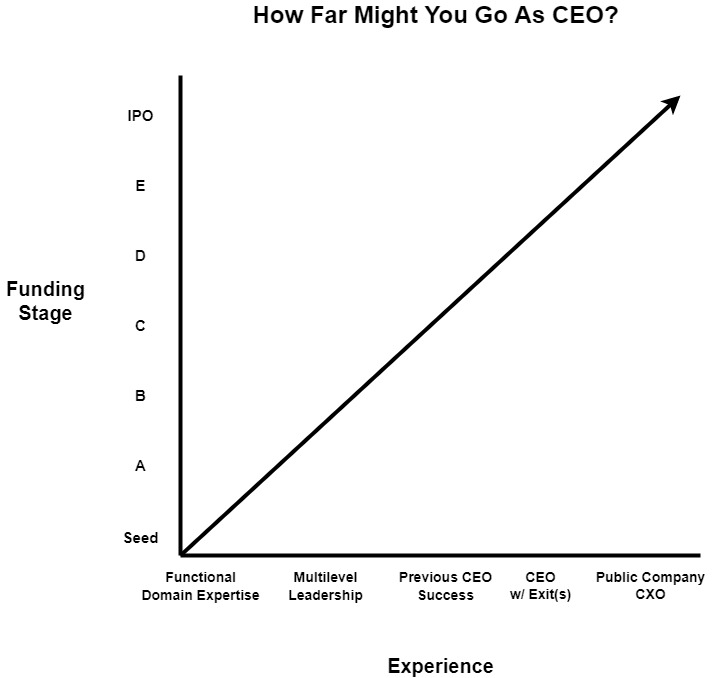I believe everyone should have the opportunity to enjoy the fruits of success. The unfortunate reality once you take off those rose-colored glasses, however, is that nobody is entitled to success!
This brings us to a dilemma most founders face. As the founder who became the CEO, how long are you “entitled” to pilot the organization as its CEO? Futhermore, as the founder, should your primary goal be to make sure the company is successful “by any (legal, ethical, and moral) means necessary?” If so, that may well include setting aside your ego and bringing in someone with the actual CEO experience necessary to help you and the company flourish in the long run.
The Reality of Founders Stepping Down
Most first-time founders would say they understand it’s not IF, but WHEN they should hire a professional CEO. And many founder CEOs also recognize that it’s unlikely they will remain CEO throughout the company’s journey.
So, if founders who assume the CEO role understand that reality, why do so many attach their identity to the CEO role, as opposed to attaching their identity to their company’s long-term success no matter what role they play? Is it just an ego thing or is there something else going on?
Before we try to answer that question, let’s look at some facts:
- According to venture capitalist and Super Founders: What Data Reveals about Billion-Dollar Startups author Ali Tamaseb, founder CEOs have remained heads of a greater number of unicorns, or billion-dollar startups, over the past 15 years. But…
- Unicorn startups with founder CEOs are exceptions and not the rule. According to John Danner, a lecturer at UC Berkeley’s Haas School of Business, it’s fairly uncommon for a founder to stay through an IPO. A 2018 study from the Harvard Law School Forum on Corporate Governance found among companies that IPO, 60 percent no longer have founders as CEOs, and only half of the others make it three years as CEO post-IPO.
- In Noam Wasserman’s 2008 article “The Founders Dilemma” in the Harvard Business Review, he says, “Four out of five entrepreneurs…are forced to step down from the CEO’s post. Most are shocked when investors insist that they relinquish control, and they’re pushed out of office in ways they don’t like and well before they want to abdicate.” He then cites reports in the Journal of Political Economy (2000) and the American Economic Review (2002), which showed “entrepreneurs as a class make only as much money as they could have if they had been employees,” they make even less if you account for the higher risk,” and “often make decisions that conflict with the wealth-maximization principle.”
- A study done by the World Management Survey showed companies that are led by their founders are 9.4% less productive with consistently low management scores and that both factors typically increase when the founder-CEO is replaced.
Taking Things Personally
You’ve nurtured your company from its infancy, making all the key decisions along the way. Your vision, passion, and expertise have been directly responsible for the company’s growth to this point. Now, at this new inflection point in development (new round of funding, IPO, acquisition, merger, or other), you and the company are one in the public’s eyes. It’s only natural for you to want to maintain company control through future stages of growth.
Who better to be a reliable steward of your vision? This is exactly the right question you should be asking. Could someone else with more robust experience and track record of success as a CEO provide your company with a better outlook?

At a certain point, an organization grows beyond where a founder can effectively manage it, especially a founder whose strengths in building the company, its solutions, and staff were mainly on the technical side. This is where a founder’s passion and commitment come into conflict with the organization’s long-term needs.
Wasserman observes in The Founder’s Dilemma, “Their success makes it harder for founders to realize that when they celebrate the shipping of the first products, they’re marking the end of an era. At that point, leaders face a different set of business challenges…The organization has to become more structured, and the CEO has to create formal processes, develop specialized roles, and, yes, institute a managerial hierarchy. The dramatic broadening of the skills that the CEO needs at this stage stretches most founders’ abilities beyond their limits.”
In an October 2019 IPO Hub article titled “Founder Control,” Rand Hawk detailed some of the responsibilities CEOs must master, including the ability to “understand and analyze finance and accounting issues, foster relationships with investors and analysts, know how to navigate regulatory and governance matters, and create operational efficiencies.” He then observed that “While some founders may excel in all these roles at any stage of company development, investors understand that those individuals are rare exceptions.”
In order to meet this new set of challenges, a founder’s level of mindfulness and ability to evaluate the limitations of his or her own managerial skills and experience are critically important. And, make no mistake, if you aren’t able to decide whether it’s time for you move on or at least into a different role, your Board and/or investors will.
Recognize the Benefit of Letting Go
In his May 2019 article “Why Some Founders Fail As CEOs” for Entrepreneur magazine, Sahil Vora wrote, “Founders need to remember that the rules change when investors come on board. If they want to scale their startup successfully into a big enterprise, they must be able to do what’s right for the company and its employees.”
Often, first-time founders who get replaced are better off relinquishing control and bringing in a new CEO and assuming a different role within the company, if not becoming an absentee founder/owner. The sooner a mindful founder can tap his or her emotional intelligence and understand the merits for the company of hiring a professional chief executive, the sooner the company can reach its revenue potential.
Google Makes the Case
Once again, Google and its co-founders Larry Page and Sergey Brin provide a useful business case on the importance of making the right leadership decisions for a growing company’s wellbeing. Google’s investors urged Page and Brin to step aside in 2001, and the company brought in the experienced CEO of Novell Eric Schmidt. Here’s how The Verge writer Nick Statt described the transition as part of his December 2019 article providing a chronology of the co-founders’ rollercoaster history:
“For Google stakeholders and the company’s more experienced executive leadership, it was a way to sideline the stubborn but socially awkward Page from doing too much damage to the company while it was still growing exponentially.
Ultimately, however, Page’s ability to let others step in and take the reins, a learning he would draw throughout his career, was a recognition that power and forward-facing leadership don’t always go hand in hand, and that he and Brin could both be effective at the company and retain their influence without overseeing every aspect of the business. Although at the time, Page was notoriously unhappy about having to relinquish control to non-engineers.”
Ten years later, in January 2011, Page would be back at Google’s CEO helm having benefitted from a decade of learning and mentorship from Schmidt. The day Schmidt moved into his advisory role as Google’s Executive Chairman of the Board, he tweeted, “Day-to-day adult supervision is no longer needed.”
In 2019, having completely restructured a company now worth almost $1 trillion, the enigmatic Page and Brin again stepped down to hand over daily operations to CEO Sundar Pichai, but retained their controlling shares and seats on the board. Statt notes in his article that both co-founders keep in regular contact with the new CEO.
In Rand Hawk’s IPO Hub piece, he points out that if a founder chooses to stay, he or she can “continue to influence the company’s direction, keeping it more in line with her founding vision.” He says founders are able to “pass on important knowledge to the new CEO which can help increase the company’s chances of success. A founder’s continued contributions and innovations can help increase the value and impact of the company.”
Finally, an often-overlooked benefit of letting go as a first-time founder is how much you will learn during the transition process that you can apply to your next venture. This experience will better position you to take your next company even further.
Next time on StartupHeat, we’ll talk about talent management. Until then, stay curious, focus on the signal, and make mindful decisions on your journey to success!



